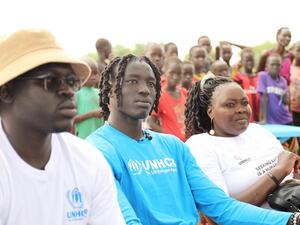UNHCR ready for possible influx of Malian refugees in neighbouring countries
UNHCR ready for possible influx of Malian refugees in neighbouring countries

A displaced Malian woman gets ready to prepare a meal in their new home in Bamako, capital of the country.
NIAMEY, Niger, January 16 (UNHCR) - Upriver from Niamey, in Mali, heavy combat is triggering a fresh displacement of civilians. But despite funding shortages, the UN refugee agency is ready to respond to any deepening of the humanitarian crisis, including an outflow to neighbouring Niger, Mauritania and Burkina Faso
"We have been preparing contingency plans and getting ready on the ground to ensure that we can deal with various possible scenarios," said Karl Steinacker, the UNHCR representative in Niger. "The provision of water, sanitation and hygiene, health, education, protection from sexual and gender-based violence (SGBV), and child protection are our main priorities," he added.
UNHCR's offices in Bamako, Mali as well as other neighbouring capitals have also prepared contingency plans in the past few months with other UN agencies, NGOs and national authorities to cope with a further possible population displacement of 300,000 internally displaced people (IDP) inside Mali and 407,000 to surrounding countries.
The situation in Mali, which has been embroiled in political upheaval for the past year, escalated last week when the French military intervened to help Malian government troops halt an advance toward the capital, Bamako, by Islamists linked to Al Qaeda.
Since these developments in the military situation, there has been a noticeable increase in the number crossing into neighbouring countries - almost 1,500 have crossed into Niger, Mauritania and Burkina Faso since last Friday. The figures could multiply if the combat intensifies and persists. UNHCR teams are monitoring the borders.
"Refugees are telling us they fled the ongoing military intervention, the absence of subsistence opportunities and basic services, and the imposition of Sharia law," UNHCR spokesman Adrian Edwards said in Geneva on Tuesday.
UN staff reported that 460 refugees had made their way to western Niger's Mangaize camp or the Tillia, Banibangou and Tillabery sites. In Burkina Faso's Sahel region, UNHCR teams at Mentao and Demba camps on Wednesday reported 497 new arrivals from Mali. Most said they had come from the Gao, Timbuktu and Mopti regions, citing the military intervention as one of their main reasons for fleeing.
UNHCR and its partners are providing new arrivals at reception centres with food, water and medical care prior to their transfer to refugee camps. In Burkina Faso, eight new arrivals have been hospitalized with measles. The refugee agency hopes to conduct a border monitoring mission soon to assess the situation there.
In Mauritania, the number of people arriving at the Fassala transit centre had risen to 681 as of yesterday, mostly women and children from Lere in central Mali's Timbuktu area. They told UNHCR they had fled for fear of bombardment of the town, which was attacked at the weekend.
UNHCR personnel in Mauritania took part in a joint assessment mission to the border with Mali at the weekend and reported that people were being allowed to cross. New arrivals are registered at the Fassala centre before being taken to Mbera camp, which is hosting more than 54,000 refugees from previous displacements last year.
Meanwhile, in UNHCR's Niamey office, opened in February last year a month after the crisis in Mali erupted when Mali government soldiers fought with Tuareg rebels, the refugee agency has been working to assure adequate assistance and protection in Niger, despite many challenges, including insecurity, drought and food shortages.
The border areas, which have received most of the refugees from Mali, are under-developed and are difficult to reach. Logistical constraints are compounded by poor infrastructure and the harsh climatic conditions, which include flooding during the rainy season. "The sustainability of an operation like this is always a challenge for UNHCR. We need to make sure that there are enough resources to meet all the needs," stressed Steinacker. This includes funding: UNHCR appealed last year for US$123.7 million for its Mali crisis operations, but has received only about 60 per cent to date.
Steinacker said that UNHCR and the authorities had also been conducting a more comprehensive registration of all refugees in Niger. Once this is completed, some of the estimated 50,000 Malian refugees in Niger will be relocated away from the dangerous border areas. It will also provide better and more reliable data on needs.
Inside Mali, population movements remain very fluid while lack of access to the rebel-controlled north makes it difficult for humanitarian agencies to update displacement figures. As of Tuesday, the Commission on Population Movements reported that almost 230,000 people had been forcibly displaced in Mali since early 2012. There are also an estimated 144,500 Malian refugees in the region, including 54,000 in Mauritania, 50,000 in Niger, 38,800 in Burkina Faso and 1,500 in Algeria. Small groups are also in Guinea and Togo.
Many of the IDPs in Mali have sought shelter in urban areas like Bamako, but life is tough. Like many IDPs, 40-year-old Oulamine is struggling to make ends meet. He fled from the Timbuktu region several weeks ago with his wife and three children and reached the town of Mpoti after travelling for 10 days by canoe on the Niger River. They then rented a car to reach Bamako. He pays the equivalent of US$60 a month to rent a room in the capital and says, "I will not be able to afford this for long." He also has to pay for electricity while the family has no access to running water. "Medicine and food for the family is also expensive," he said.
By William Spindler, Helene Caux and Charles-Arthur Pierre-Jacques








